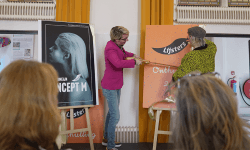A chat with Sorrell Pitts, Series Editor of Penguin Readers
The new Early Blackbirds are bestsellers, rewritten by the experts of Penguin Random House. The adaptations are suitable for students between 12 and 14 years of age. Sentences are shorter and the amount of new words is limited. But still there is enough English input to reach a higher level of understanding. A good reason to have a chat with Sorrell Pitts, Series Editor of Penguin Readers.
In gesprek met Sorrell Pitts, Series Editor van Penguin Readers
De nieuwe Early Blackbirds zijn bestsellers, herschreven door de experts van Penguin Random House. Ze passen bij het taalniveau van leerlingen tussen 12 en 14 jaar. De zinnen zijn korter en het aantal nieuwe woorden is beperkt. Toch is er genoeg Engelse input om op een hoger niveau te komen. Reden genoeg om in gesprek te gaan met Sorrell Pitts, Series Editor van Penguin Readers.
The Early Blackbird are original books which are edited to make them more accessible for students.
How does this process work?
The stories are completely fresh retellings of the original story, written in line with a strict syllabus and word list created for the series which is mapped to the Common European Framework of Reference (Europese taalniveaus, red.). It is really down to the teachers and students to then choose books which are appropriate in terms of content and level. We suggest choosing either at their level or one below – this will help to build their confidence and consolidate their learning.
How do the Early Blackbirds help students to improve their English?
Everyone loves to read stories. Just as when we read stories in our own language, wanting to know what happens provides an incentive for students to want to read on to the end. The students are enjoying themselves and do not realize that they are learning. When they do ‘extensive reading’, they are exposed to a range of new vocabulary which is then recycled throughout the text.
The students also see the grammar they have learnt used in a more ‘natural’ context. Extensive reading gives students a much more immersive experience, much like when you learn a language whilst living in a foreign country. There is a lot of research to show that students’ vocabulary and grammar acquisition dramatically increases if they regularly use
graded readers (aangepast boek, red.).
What makes a book a good book to be adapted as an Early Blackbird?
This is one of the most challenging aspects of publishing graded readers. We aim to choose titles which we feel will appeal to both boys and girls and have a story which is straightforward in its telling. It is best if, at the earlier levels, the story is linear (without flashbacks) and includes simple, universal issues that all the students will relate to and understand. So, for example, Tales of Ancient Egypt is a collection of myths and legends that explore the gods, heroes, and magical stories of ancient Egyptian culture. Clouds over California is a coming-of-age story about a teenage girl navigating family tensions, identity, and belonging during the social upheaval of 1970s California and This Summer's Secrets is a coming-of-age novel filled with mystery about a girl uncovering dark truths during a summer in the Cornish countryside.
What happens once you picked a book as a candidate for an Early Blackbird adaptation?
First a report is written on the book to check that it is appropriate for adaptation as a graded reader, and a suitable level is suggested. Obviously the higher the level, the greater the age of the students, so the higher levels tend to be more ‘mature’ in theme.
Once the story has been retold by the ELT author (English Language Teaching, red.), it is then edited and checked to make sure that the story flows and the levelling is appropriate. An artwork brief is created for the illustrations which provide visual support for understanding complicated scenes or difficult vocabulary. Once everyone in the editorial team is happy with the final manuscript, the book is then sent to design where the text is ‘laid out’ and the illustrations are drawn and then placed. The final proofs are then sent to be printed.
An original version of a book might be too long.
How do you decide what can be left out or what needs to be altered?
This often happens! Before the author starts the adaptation, he/she creates a ‘book plan’ of each chapter, which show how he/she intends to reduce the story, outlining which bits will be kept in or left out. This is then checked and sometimes changes are made if the editor doesn’t agree with parts of the plan. Once the plan is finalized, the author can begin writing the full manuscript.
Do you also look at the structure and storyline of the original version, to make things more accessible?
Yes, we do this. Much depends on the level we are adapting it at. So, in the case of a book with lots of flashback, we would ideally want it written above B1+ as past perfect is allowed, thus making it much easier to move back in time. However, for lower levels we might look at making the story more linear. We are less likely to change the perspective though some minor characters might be cut in order to condense and simplify things.
How do you handle specific difficulties in grammar and sentences that students might not understand yet?
We come across a lot of this and we rewrite them. For example, one of the former titles of Blackbirds, The Boy in the Striped Pyjamas was adapted at level 4, which does not allow reported speech or past simple. It also has some difficult vocabulary. In the original book, the text is as follows:
…he [Bruno] wasn’t entirely sure what job Father did. In school, they had talked about their fathers once day and Karl had said that his father was a greengrocer, which Bruno knew to be true because he meant the greengrocer’s shop in the centre of town. And Daniel had said that his father was a teacher, which Bruno knew to be true because he taught the big boys who it was always wise to steer clear of. And Martin had said that his father was a chef, which Bruno knew to be true because he sometimes collected Martin from school and when he did he always wore a white smock and a tartan apron, as if he’d just stepped out of the kitchen.
But when they asked Bruno what his father did he opened his mouth to tell them, then realized that he didn’t know himself. All he could say was that his father was a man to watch and that the Fury had big things in mind for him. Oh, and that he had a fantastic uniform too.
This has been retold as:
But Bruno was not sure what job Father actually did. At school, his friends often talked about their fathers. Bruno knew that Karl’s father worked in a shop, and Daniel’s father was a teacher. But when his friends asked about Bruno’s father, he just said, “Father is an important man and the Fury has big plans for him. And he wears a wonderful uniform.”
How do you handle difficult words? Do you replace them with more commonly used words?
We try to replace them with words which are levelled by the CEFR around the same as the level of the book. The example of The Boy in the Striped Pyjamas gives you an idea of how we do this. The phrase ‘man to watch’ has been replaced by ‘important man’; ‘big things in mind’ has been replaced by ‘big plans’; and ‘fantastic’ has been replaced by ‘wonderful’.


